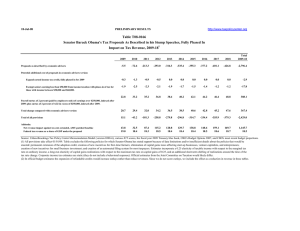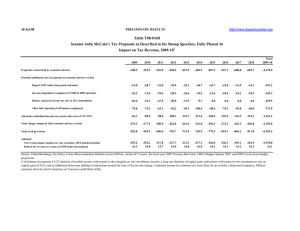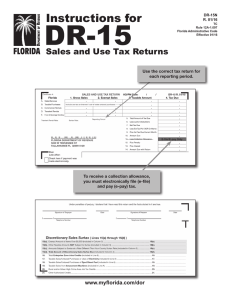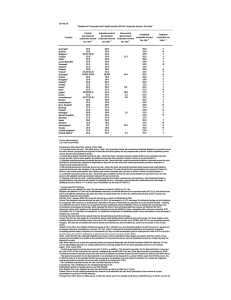14-Aug-08 PRELIMINARY RESULTS
advertisement
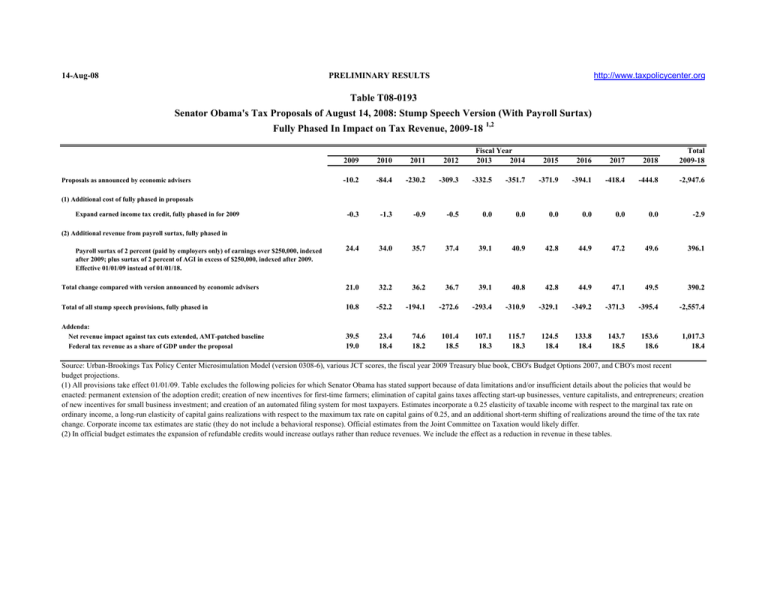
14-Aug-08 http://www.taxpolicycenter.org PRELIMINARY RESULTS Table T08-0193 Senator Obama's Tax Proposals of August 14, 2008: Stump Speech Version (With Payroll Surtax) Fully Phased In Impact on Tax Revenue, 2009-18 1,2 Fiscal Year 2013 2014 2015 2016 2017 2018 Total 2009-18 -351.7 -371.9 -394.1 -418.4 -444.8 -2,947.6 0.0 0.0 0.0 0.0 0.0 0.0 -2.9 37.4 39.1 40.9 42.8 44.9 47.2 49.6 396.1 36.2 36.7 39.1 40.8 42.8 44.9 47.1 49.5 390.2 -52.2 -194.1 -272.6 -293.4 -310.9 -329.1 -349.2 -371.3 -395.4 -2,557.4 23.4 18.4 74.6 18.2 101.4 18.5 107.1 18.3 115.7 18.3 124.5 18.4 133.8 18.4 143.7 18.5 153.6 18.6 1,017.3 18.4 2009 2010 2011 2012 -10.2 -84.4 -230.2 -309.3 -332.5 -0.3 -1.3 -0.9 -0.5 24.4 34.0 35.7 Total change compared with version announced by economic advisers 21.0 32.2 Total of all stump speech provisions, fully phased in 10.8 Addenda: Net revenue impact against tax cuts extended, AMT-patched baseline Federal tax revenue as a share of GDP under the proposal 39.5 19.0 Proposals as announced by economic advisers (1) Additional cost of fully phased in proposals Expand earned income tax credit, fully phased in for 2009 (2) Additional revenue from payroll surtax, fully phased in Payroll surtax of 2 percent (paid by employers only) of earnings over $250,000, indexed after 2009; plus surtax of 2 percent of AGI in excess of $250,000, indexed after 2009. Effective 01/01/09 instead of 01/01/18. Source: Urban-Brookings Tax Policy Center Microsimulation Model (version 0308-6), various JCT scores, the fiscal year 2009 Treasury blue book, CBO's Budget Options 2007, and CBO's most recent budget projections. (1) All provisions take effect 01/01/09. Table excludes the following policies for which Senator Obama has stated support because of data limitations and/or insufficient details about the policies that would be enacted: permanent extension of the adoption credit; creation of new incentives for first-time farmers; elimination of capital gains taxes affecting start-up businesses, venture capitalists, and entrepreneurs; creation of new incentives for small business investment; and creation of an automated filing system for most taxpayers. Estimates incorporate a 0.25 elasticity of taxable income with respect to the marginal tax rate on ordinary income, a long-run elasticity of capital gains realizations with respect to the maximum tax rate on capital gains of 0.25, and an additional short-term shifting of realizations around the time of the tax rate change. Corporate income tax estimates are static (they do not include a behavioral response). Official estimates from the Joint Committee on Taxation would likely differ. (2) In official budget estimates the expansion of refundable credits would increase outlays rather than reduce revenues. We include the effect as a reduction in revenue in these tables.
